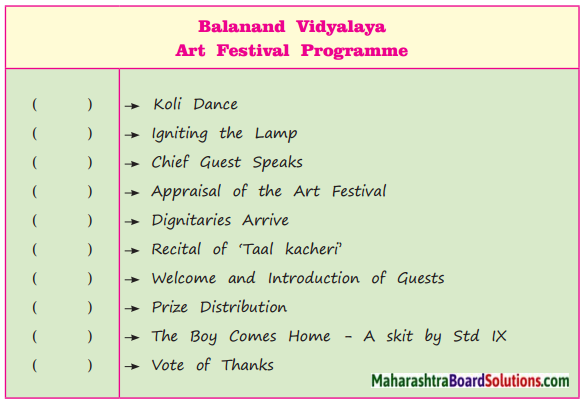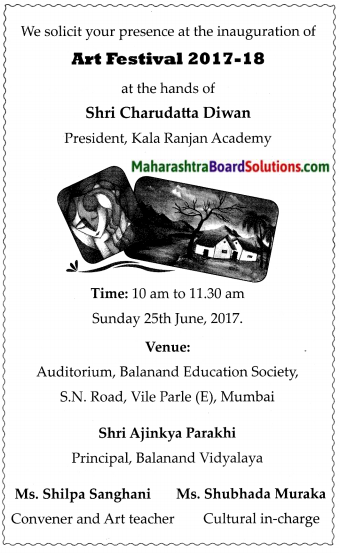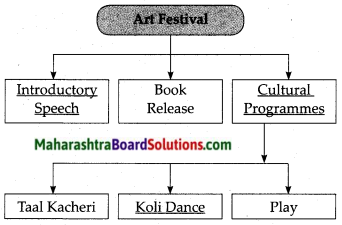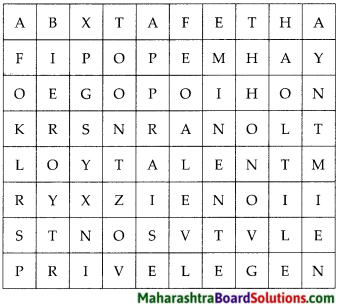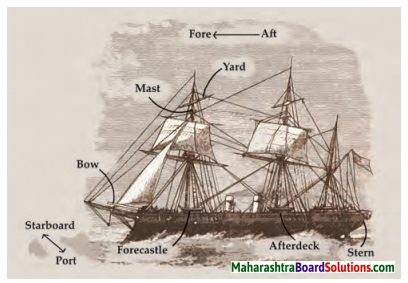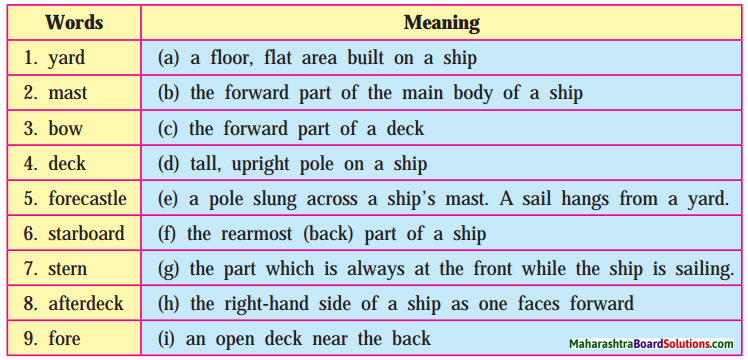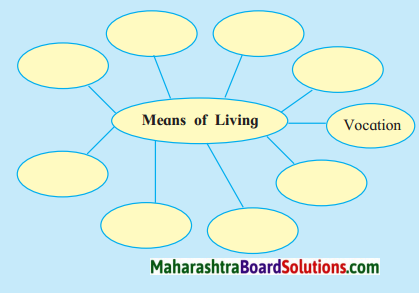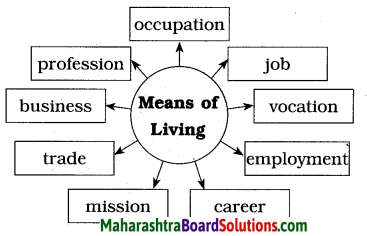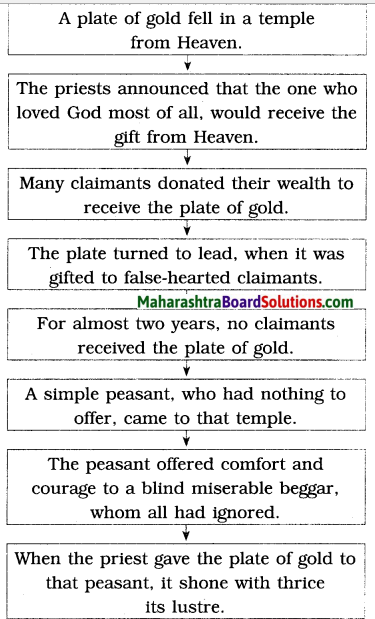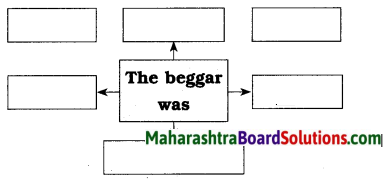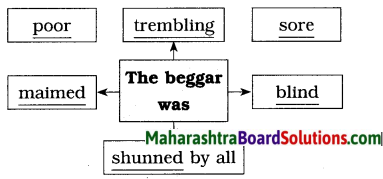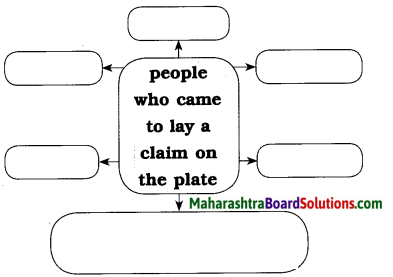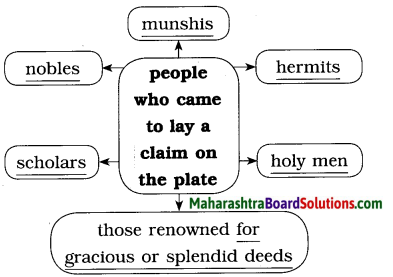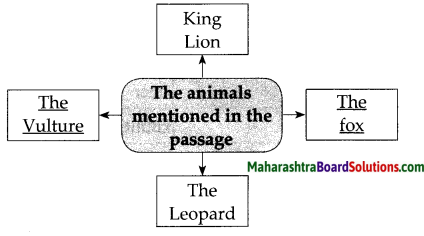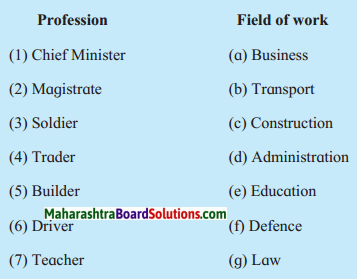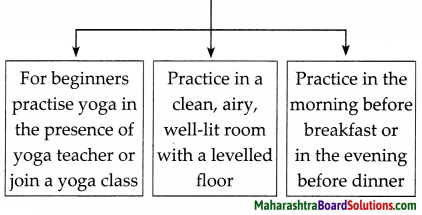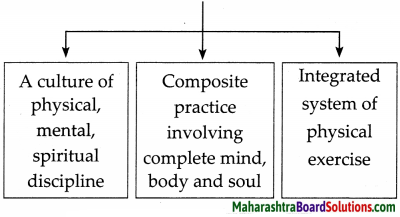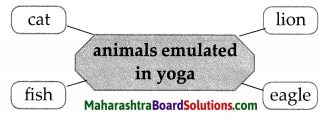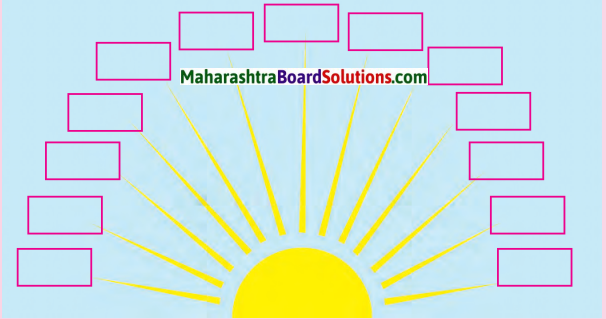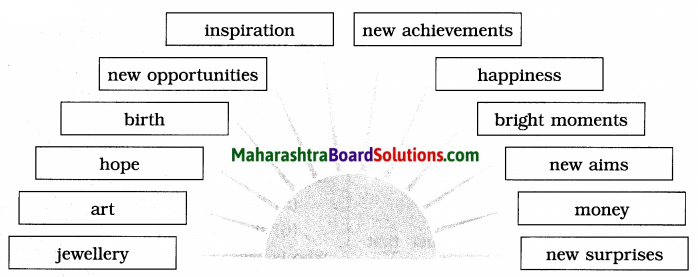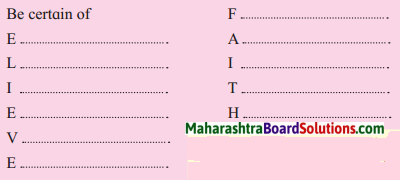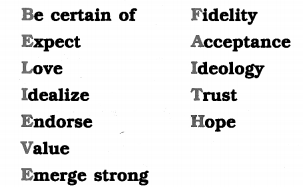Balbharti Maharashtra State Board Class 7 English Solutions Chapter 3.4 The Brook Notes, Textbook Exercise Important Questions and Answers.
Std 7 English Lesson 3.4 The Brook Question Answer Maharashtra Board
Class 7 English Chapter 3.4 The Brook Textbook Questions and Answers
1. Read the poem aloud with proper pace and rhythm.
2. Find the meaning of the following words.
- ridges: Long narrow hill to or range (mountain bridges.
- brimming: full of the margin/over followed. Full of water up to the to pledge.
- eddying: spiral movement of water.
- babble: meaningless talking/sound made when ones talk loudly
- fallow: wasteland/left land
- trout: A big freshwater fish
- netted: Form of a net.
![]()
3. Answer the following.
The Brook Question Answers Class 7 Question 1.
Who is the speaker in this poem?
Answer:
The brook is the speaker in this poem.
The Brook Poem Class 7 Question 2.
Which lines are repeated in the poem? What do they mean?
Answer:
The lines ‘For men may come and men may go, But I go on forever’ are repeated. They mean that nature is immortal whereas we are mortal. Men are born and will die but nature is eternal.
3.4 The Brook Question 3.
Where does the brook join the river?
Answer:
The brook joins the river near Philip’s farm.
The Brook Poem Class 7 Solutions Question 4.
Mention the various places that the brook flows past.
Answer:
The brook flows past the dwellings of coot and hern, the ferns, a town, villages, valleys, hills, ridges, several bridges and Philip’s farm.
![]()
English Brook Class 7 Solutions Question 5.
Often the brook speaks of itself as if it is human. For example, ‘I bicker down a valley’. Find two other examples of the human activities of the brook.
Answer:
1. I slip, I slide, I gloom, I glance.
2. I murmur under moon and stars.
4. Spot and write any three alliterative phrases or sentences from the poem.
The Brook Poem Std 7 Question Answer Question 1.
Spot and write any three alliterative phrases or sentences from the poem. (Alliterative phrases/sentences are those in which the same sound is repeated.)
Answer:
1. I slip, I slide, I gloom, I glance.
Sound of ‘s’ and ‘g’ is repeated.
2. I bubble into eddying bays.
I babble on the pebble.
Sound of ‘b’ is repeated.
3. By many a field and fallow.
Sound of ’f’ is repeated.
![]()
5. List the prepositions you find in this poem.
The Brook Poem Question And Answers Class 7 Question 5.
List the prepositions you find in this poem.
Answer:
from, among, to, in, with, etc.
6. List the phrases which have the expression ‘many a…’.
Maharashtra Board Class 7 English Solutions Question 6.
List the phrases which have the expression ‘many a…’.
Answer:
many a curve, many a fairy foreland, many a silvery water break.
7. The poet uses words to create pictures or ‘images’ in the reader’s mind.
3.4 The Brook Question Answer Question 7.
The poet uses words to create pictures or ‘images’ in the reader’s mind. For example, ‘And sparkle out among the fern’. Write down other lines that create images or pictures in your mind. (Any 3)
Answer:
- By twenty thorpes, a little town An half a hundred bridges.
- By thirty hills I hurry down, or slip between the ridges.
- I make the netted sunbeam dance Against my sandy shallows.
![]()
8. Write a short autobiography of a brook.
The Brook Class 7 Question 8.
Write a short autobiography of a brook. (20 to 30 lines)
Answer:
Autobiography of a Brook
I took origin among the mountains and glaciers in the lap of a slopy snowy terrain as a bubbly ever youthful brook. Many others joined me making me look bigger. I express my happiness by dancing and jumping as I flow down the valley. I am ever so glad to help birds and animals to quench their thirst. The trees in the valley are so grateful to me that they honour me by showering flowers upon me.
As I reach the plains, I slow down. My calm within and outside, inspires many great poets to offer their literary best. I am obstructed by many boulders, but I do not stop. I find my way by flowing around them. By the time I meet the big river, many small rivulets have formed from me. But now, their number is decreasing,.
I hear that the rains are often scanty. If this goes on, I might not exist at all in the future. I have served mankind for as long as I know. I plead with you all to plant more trees and preserve and protect nature for our mutual well being. Help us to survive and continue to serve you.
9. Which other things in nature can say.
The Brook Poem Std 7 Question 9.
Which other things in nature can say – ‘For men may come and men may go, But I go on forever.’?
Answer:
The sun, stars, clouds, moon, wind, space are things in nature that can say the given lines.
![]()
10. Use the internet, your school library or other sources for the following activities.
The Brook Poem Question And Answers Question 10.
Use the internet, your school library or other sources for the following activities.
1. Try to find other nature poem.
Answer:
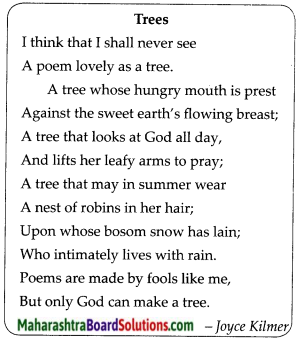
Class 7 English Chapter 3.4 The Brook Additional Important Questions and Answers
Answer in one sentence.
Question 1.
What does the chattering sound of the brook seem like?
Answer:
The chattering sound of the brook seems like musical sounds.
Question 2.
Why does the bank fret?
Answer:
The bank frets because the brook changes its shape quite often by curving.
![]()
Question 3.
The brook mentions exact numbers of hills, villages and bridges. What does it mean?
Answer:
The brook mentions exact numbers to maintain the rhythm of the poem. It actually means that it flows past several hills, villages and bridges.
Question 4.
What do we learn from the brook?
Answer:
The brook teaches us to be cheerful and enjoy what we do. It also teaches us that we should never stop when we come across obstacles. With grit and patience, we should overcome these obstacles and achieve our goals.
Reading Skills, Vocabulary and Grammar.
Simple Factual Questions.
Question 1.
What do the following do?
Answer:
- blossom – sail
- swallow – skim
- sunbeam – dance
Complex Factual Questions.
Question 1.
Name the marine beings mentioned in the poem?
Answer:
The poet mentions fishes such as trout and grayling and also the swallow bird.
![]()
Question 2.
Which words of movement does this part of the extract mention?
Answer:
The extract mentions many words of movement such as travel, go, slip, slide, flow sail, loiter.
Poetic device.
Question 1.
Pick out an example of Antithesis.
Answer:
I wind about, and in and out.
Question 2.
State the rhyme scheme used in the second last stanza.
Answer:
Rhyme scheme – abab.
Question 3.
What according to you is the tone/mood of the poem? Why?
Answer:
The mood/tone of the poem is cheerful as it traces the journey of a happy brook right from its origin to its mouth. There is a hint of music in lines that helps us visualize the flow of the brook.
State and explain the figures of speech.
Question 1.
I come from haunts of coot and hem.
Answer:
Alliteration – the sound of ’h’ is repeated in ’haunts’ and ’hern’ in a pleasant manner.
![]()
Question 2.
I make a sudden sally.
Answer:
Alliteration – the sound of ’s’ is repeated in ’sudden’ and ’sally’ for a better poetic effect.
Question 3.
To bicker down a valley.
Answer:
Personification – the brook has been given the human quality of ’bickering’.
Question 4.
By thirty hills I hurry down.
Answer:
Inversion: the prose order has been changed. The correct word order is ’I hurry down by thirty hills’.
Alliteration: the sound of ‘h’ repeated in hills and hurry for poetic effect.
Question 5.
By twenty thorpes, a little town An half a hundred bridges.
Answer:
Hyperbole – the statement is exaggerated for a poetic effect.
Question 6.
Till last by Philip’s farm I flow
Answer:
Alliteration – the sound of ’f is repeated in ’farm’ and ’flow’ for a better poetic effect and also the word Philip as it has an ’f sound.
![]()
Question 7.
I chatter over stony ways
Answer:
Personification – the brook has been given the human quality of ’chattering’.
Question 8.
With many a curve my banks I fret
Answer:
Inversion – the word order has been changed. The correct word order is T fret my banks with many a curve’.
Question 9.
With willow-weed and mallow
Answer:
Alliteration – the sound of ‘w’ is repeated in the world ‘with’, ‘willow’ and ‘weed’.
Question 10.
I chatter, chatter as I flow
Answer:
Repetition – the word ‘chatter’ is repeated for a poetic effect.
Question 11.
I wind about and in and out
Answer:
Antithesis – two opposite words ‘in’ and ‘out’ are used in the same line for a better poetic effect.
![]()
Question 12.
And here and there a lusty trout
Answer:
Antithesis – two words of opposite meaning ‘here’ and ‘there’ are used in the same line for poetic effect.
Question 13.
And here and there a foamy flake
Answer:
Alliteration – the sound of ‘f is repeated in ‘foamy’ and ‘flake’ for a better poetic effect.
Question 14.
For men may come and men may go
Answer:
1. Antithesis: two words it opposite meaning ‘come’ and ‘go’ are used in the same line for a better poetic effect.
2. Repetition: the word ‘men’ is repeated for a better poetic effect.
Question 15.
I make the netted sunbeam dance
Answer:
Personification – sunbeam is given the human quality of ‘dancing’.
![]()
Question 16.
I linger by my shingly bars;
I loiter round my cresses
Answer:
Personification – the brook is given the human quality of ‘lingering’ and ‘loitering’.
The Brook Summary in English
The narrator of the poem, The Brook, takes us along its course. It narrates that it begins from the places often visited by birds. It makes noise while coming down the valley. The sunlight makes the brook’s water sparkle as it flows among the ferns and through several villages. Finally it passes by Philip’s farm and joins the overflowing river. It creates a lot of bubbles and noise while swirling around an obstacle.
The brook says that it makes a lot of turns and etches out a path full of curves. Passing by many ups and downs, the brook carries blossoms on its way. A lot of fishes accompany it. Moving through different curves, the brook clashes and creates silvery water break. At the base of the brook, there are golden coloured stones. The reflection of the sunlight on the moving waters of the brook makes it seems as if the sun beams are dancing. At night under the moon and the stars, it murmurs through thorny bushes. Avoiding the obstacles, it finally flows into the river.
Introduction:
The poem ‘The Brook’ by Lord Tennyson or Alfred Lord Tennyson traces the journey of a brook from its origin to its mouth. Though very simple, the poem conveys a very deep message in a very subtle manner. The refrain in the poem ‘But I go on forever’ tells us that nature is eternal whereas we are emphemeral or short lived. We may come and go but nature stays forever.
![]()
Glossary:
- haunt (n) – a place that one visits often, where one spends a lot of time
- coot and hem (n) – water birds
- sally (n) – a quick journey like an entrance to fairy land
- bicker (v) – run noisily
- ridges (n) – a long, narrow mountain range
- thorpes (n) – old English word for a village
- brimming (adj) – be full to the point of overflowing
- sharpes and trebles (n) – musical sounds
- eddying (adj) – move in a circular motion.
- babble (v) – to make murmuring sound of on the bottom. water flowing over stones
- fret (v) – wear out, gnaw
- fallow (n) – uncultivated land
- fairy foreland (n) – a scenic place that looks
- willow-weed (n) – a type of plant
- mallow (n) – a plant with purple flowers
- lusty (adj) – healthy and strong
- front (n) – a freshwater fish
- flake (n)- small, flat piece of something
- water break (n) – a place in a brook where the surface of the water is broken by irregularities on the bottom.
- grayling – a freshwater fish with a long fin.
- gravel (n) – pounded stones
- skimming swallows (n) – swallows that touch the brook lightly and quickly as they or stones. fly over it.
- shallows – an area of the brook where the water is not very deep.
- brambly (adj) – full of prickly shrubs.
- wildernesses (n) – an uncultivated region
- shingly (adj) – full of small, rounded pebbles
- bars (n) – barrier, obstacle
- cresses (n) – small plants
- trout (n) – freshwater fish of salmon family
7th Std English Balbharati Textbook Solutions
- Tartary Class 7 English Textbook Solutions
- Compere a Programme Class 7 English Textbook Solutions
- A Crow in the House Class 7 English Textbook Solutions
- The Brook Class 7 English Textbook Solutions
- News Analysis Class 7 English Textbook Solutions
- Think Before You Speak! Class 7 English Textbook Solutions
